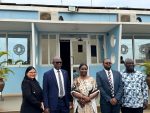Managing Director of Monasa Advisory & Associates and Chairperson of Economic Association of Namibia, Jason Kasuto joined a panel discussion at the Namibia Chamber of Commerce and Industry’s (NCCI) Namibia Business Symposium held at the Walvis Bay Port this past week. Under the theme “Championing Namibia’s Local Content for Diversity, Inclusion & Sustainable Economic Growth,” various topics were unpacked during the full day interactive engagement.
Commencing as from July 3rd, the continuous discussions allowed attendees to further unpack many topics including current status & challenges in the Namibian oil industry operating environment and proposals for interventions, An Introduction to an Integrated National Local Content Policy Concept Note, The Prowess of Logistics as the Transmission Belt for Connecting Industries, Economic Expansion and Sustainable Development and Creating Direct Value for Namibians in the Blue Economy.
Focusing on Advancing Namibian local content policy interests- inputs and perspectives, Kasuto joined panel discussion alongside Maria Mbudhi, Chairperson of Public Affairs Committee NAMPOA, Antoine Berel, Vice-President for Sub-Saharan Africa- Halliburton, Joao Tiago SLB Country Manager and Knowledge Ipinge- Acting Managing Director – Operatec Maritime and Industrial Training College. This panel discussion was introduced by the Ministry of Mines and Energy through a presentation on “National Upstream Petroleum Local Content Policy- A Presentation on Current Policy Status.”
Kasuto shared his sentiments around local content policy interests mentioning that it plays a crucial role in ensuring that the exploitation of the country’s natural resources benefits its citizens and promotes national development. “It is incumbent on the State to ensure that it manages and regulates the exploitation of these natural resources in a manner that, while being able to attract foreign investment into the sector, the wealth from the natural resources benefits the nation and its citizens. The local content policy and amendments to the petroleum act are amongst some of the tools that can be applied to give life to article 100 of the Constitution. Article 100 of the Constitution deals with Sovereign Ownership of Natural Resources below and above the surface of the land and within the territorial waters of Namibia shall belong to the State if they are not otherwise lawfully owned. Thus, the Constitution recognizes state ownership of extractive resources, which suggests that the management, regulation, and exploitation of these resources should be conducted in a manner that benefits the nation and its citizens. Article 99 states that Foreign investments shall be encouraged within Namibia. Therefore, it is incumbent on the State to ensure that it manages and regulates the exploitation of these natural resources in a manner that, while being able to attract foreign investment into the sector, the wealth from the natural resources benefits the nation and its citizens. The local content policy and amendments to the petroleum act are amongst some of the tools that can be applied to give life to article 100 of the Constitution,” he noted.
He further emphasized the importance of the implementation of the local content policy. “The LCP sets the scene, to allow stakeholders to start alignment, but what’s fundamental is that a targeted strategy is developed to give life to the intent of the policy, getting the policy out is a necessary catalyst,” he stated.
Antoine Berel further added that it is an important tool for the management of the Namibian resources as he mentioned that the local content policy is an important tool, but he prefers looking at it from the lens of ‘in-country-value creation’ and indicated the Halliburton’s commitment to create in country value for Namibians during their operation. Furthermore, Mbudhi spoke on the need for government policies and regulations to speak to each other, to make things run smoother for Oil & Gas operators, for example, Oil block Licenses issued by Ministry of Mines & Energy have no synchronization in terms of length of time with work permits that need to be issued to foreign specialist needing to work under those oil block licenses.
Berel said the local content policy is an important tool, but he prefers looking at it from the lens of “in- country- value creation,” he indicated Halliburton’s commitment to create in country value for Namibians during their operation. Meanwhile Tiago provided impressive account of the work SLB is doing to empower the local workforce by sending graduates internationally for training in oil & gas sector. As well as their partnerships with local institutions of higher learning, SLB is also making strides in sub-contracting local companies in their operations to date.
Iipinge notified that Operatec as a subsidiary of its Angolan holding by company with local shareholding has passed various international accreditation and audits and is well underway to provide much needed training on the skills required in the oil & gas sector. In addition, Filemon stressed that traditional banking firms will not be able to meet the funding requirements of SMEs participating in the Oil & Gas sector. Having been in the private equity space for the past 10 years Ino-Harith Capital has joined forces with Modena, from Nigeria, a private equity financier, who have funding Nigerian SMEs to the time of U$200 mill to date. Moneda Namibia aims to fill the funding gap for SMEs venturing in the oil and gas sector. This full day event also had Titus Shaanika deliver a presentation on “Opportunities in the Marine Economy, concluded with summary of recommendations as well as the way forward.










